|
Music Reviews
Alternative
Blues
Books
Christmas
Classic Rock
Country
Jazz
Lounge
Oldies
Power Pop
Punk & New Wave
Reggae
Rhythm & Blues
Seventies
Texas
Special Features
Randy's Rodeo
Sex Pistols
Motown
Halloween
Valentine's Day
Information
About Me
Feedback
Links
User's Guide
Support Me
Amazon
iTunes
Sheet Music Plus
|
Support Randy's Rodeo!  Shop at Amazon
for books and more...
Shop at Amazon
for books and more...
 There's
a telling photo of Peter
Guralnick in his book Sweet
Soul Music. He is standing next to - and is dwarfed by - one of his idols, singer Solomon
Burke. Guralnick wears a shit-eating grin that belies, for once, his deep and abiding love
for the music he writes about with such dispassionate accuracy. In the picture, Guralnick
is so clearly delighted to be in the presence of "The King Of Rock 'n' Soul" that
he appears ready to skip around the room with glee. That - not the facts, not his vaunted
objectivity - is the heart of Guralnick's writing, and this devotion to music (along with
his mind-boggling research) has elevated him to the top of a now-crowded profession. There's
a telling photo of Peter
Guralnick in his book Sweet
Soul Music. He is standing next to - and is dwarfed by - one of his idols, singer Solomon
Burke. Guralnick wears a shit-eating grin that belies, for once, his deep and abiding love
for the music he writes about with such dispassionate accuracy. In the picture, Guralnick
is so clearly delighted to be in the presence of "The King Of Rock 'n' Soul" that
he appears ready to skip around the room with glee. That - not the facts, not his vaunted
objectivity - is the heart of Guralnick's writing, and this devotion to music (along with
his mind-boggling research) has elevated him to the top of a now-crowded profession.
Guralnick grew up in Boston transfixed by blues and country, and he began writing about
such music in 1964 at the tender age of 20. His peers in the emerging alternative press preferred
to write flashy features about trendy rockers, often injecting a boatload of their own personalities
into their work. Quite the opposite, Guralnick developed "a colloquial style that treated
the subject with dignity and respect." Whereas contemporaries like Lester
Bangs or Nik
Cohn sometimes became the story themselves, Guralnick defers that, "It never occurred
to me that I was - or that I should be - the subject."
"My aim in everything I write is to disappear into the world I'm writing about," Guralnick
states, and that goal has occasionally come under fire for the lack of transparency it lends
his work. The stunning net effect of Guralnick's technique, though, can be seen in books
like his acclaimed biographies of Elvis Presley (see below). Through
a patient, detailed narrative, the subject is slowly and inexorably revealed to a far greater
extent than would be possible in a more effusive, personalized book. Not that Guralnick is
dry - the Presley volumes, in particular, are real page-turners. It's just that Guralnick
lets his subjects speak for themselves, consequences be damned, and the historical record
is better off for it.
Still, Peter Guralnick's opinions and enthusiasms seep through. As he points out, "What
you put in and what you leave out are tantamount to a critical point of view." Actually,
some of his writing is fundamentally personal - accounts of his meetings with his heroes
(most memorably Howlin' Wolf, Charlie Rich, and Jerry Lee Lewis), tales of tour bus debauchery,
etc.. At this late date, though, the considerable breadth and depth of his work alone are
tantamount to testimony of what Peter Guralnick values in music - and exactly how much he
does.
Peter Guralnick's first love was fiction, and he published two early collections of short
stories, Almost
Grown (1964) and
Mister
Downchild (1967). A novel, Nighthawk
Blues, followed in 1980; out-of-print for many years, it was reissued in 2003. He also
wrote The
Listener's Guide to the Blues (1982). In 2005, Guralnick published a major new
biography, Dream
Boogie: The Triumph Of Sam Cooke.
Peter Guralnick is also frequently tapped to write liner notes, a skill
that earned him a "Best Album Notes" Grammy award in 1985 for Sam Cooke's Live
at the Harlem Square Club
(1963). Other notable contributions include Dan Penn's Do
Right Man (1992), Charlie Rich's Pictures
and Paintings (1994), Charlie Feather's Get
With It: The Essential Recordings (1998), and Elvis Presley's
30
#1 Hits (2002) and 2nd
To None (2003). (Read more about Peter Guralnick in the All
Music Guide.)
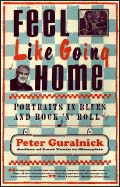 Feel
Like Going Home: Portraits In Blues, Country, and Rock 'n' Roll
by Peter
Guralnick (1971) Feel
Like Going Home: Portraits In Blues, Country, and Rock 'n' Roll
by Peter
Guralnick (1971)
The author's first book, based in part on his writings for Crawdaddy!, Rolling Stone,
and other periodicals, is one of his most personal. Recounting a loose history of the blues and the development
of rock and roll, Guralnick presents a handful of case studies from celebrated (Muddy Waters) to obscure
(Johnny Shines). Most of his subjects are deeply ambivalent about themselves or their music, and they
frequently express surprise that anyone really cares anymore. It's a sad and touching tale of how far
we'd had come to that point, and it's a wonder to think of where we were still to go. (Revised in 1999). [ top of page]
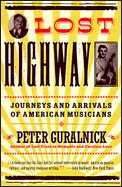 Lost
Highway: Journeys & Arrivals of American Musicians Lost
Highway: Journeys & Arrivals of American Musicians
by Peter
Guralnick (1979)
After his first book, Guralnick stopped writing about music for a few years. When he picked his pen back
up, he resolved to no longer be the critic but to write about his enthusiasms - musicians who deserved
to be heard (Sleepy LaBeef), defended (Rufus Thomas), or praised (Bobby "Blue" Bland). However,
he also began to develop the style for which he is now known, writing with respect for the music but
willing to place musicians in the cold light of reality. Having lost his naiveté but regained
his passion, Guralnick began to chronicle American roots music in a way heretofore unseen. Most of Lost
Highway is
adapted from previously written features, but it holds together like a novel. As Lester Bangs said. "You put the book down feeling that its sweep is vast, that you have read of giants
who walked among us." (Revised in 1999.) [top of page]
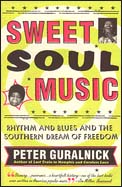 Sweet
Soul Music: Rhythm and Blues and the Southern Dream of Freedom
by Peter
Guralnick (1986) Sweet
Soul Music: Rhythm and Blues and the Southern Dream of Freedom
by Peter
Guralnick (1986)
Considered the third volume in a roots music trilogy that began with Feels
Like Going Home (1971)
and Lost Highway (1979), Peter Guralnick's Sweet
Soul Music stands quite sufficiently
and proudly on its own. Like soul music itself (which developed somewhat independently in pockets like
Memphis, Muscle Souls, and Macon), the book is episodic. Guralnick tells individual stories, patiently
allowing the big picture to form as the timeline progresses. He starts with the 50's artists ( Ray
Charles,
Sam Cooke) who fused gospel, pop, and rhythm & blues into a unique new sound, then he dwells lovingly
on soul's 60's heyday (Otis Redding, Aretha Franklin, Stax Records). Concluding in the 70's (with Al
Green) when soul gave way to funk, disco, and other synthesized forms of rhythm and blues, we are presented
with as cogent a history of this essential art form as has yet been written. (Revised in 1999) [ top of page]
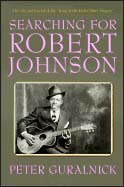 Searching
for Robert Johnson: The Life and Legend of the King of the Delta Blues Singer
by Peter
Guralnick (1989) Searching
for Robert Johnson: The Life and Legend of the King of the Delta Blues Singer
by Peter
Guralnick (1989)
The author's lifelong fascination with the blues led eventually, inevitably to his quest for the holy
grail - to unravel the mystery behind legendary delta bluesman Robert Johnson. Of course there's not
that much to discover - Johnson lived a long time ago, made only a few recordings, and died young. The
story of Guralnick's search, then, and the historical context of Johnson's life and music make up most
of this short book. It's a fascinating tale in its own right, however, and in the process, Guralnick
paints as complete a picture of Robert Johnson as we've ever had - and probably ever will. [ top of page]
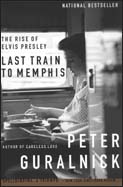 Last
Train To Memphis: The Rise of Elvis Presley
by Peter
Guralnick (1994) Last
Train To Memphis: The Rise of Elvis Presley
by Peter
Guralnick (1994)
Peter Guralnick is not renowned for his love of pop music. He apparently considered the
soft-spoken Curtis Mayfield, for instance, too insubstantial for inclusion in Sweet
Soul Music ( see above),
and he has often said he discovered Elvis Presley through the blues - not vice versa. As a young man,
Guralnick considered the King's early sessions at Sun Records to be essential - and all the rest to be
pap. Thankfully, he wised up, and we are blessed with his two-volume biography of Presley. Last
Train To Memphis, the first installment, is a landmark achievement. Guralnick approached his subject
with an unprecedented fastidiousness, and his seamless narrative makes it read like a spellbinding novel. "Definitive" doesn't
do it justice, though it is. [ top of page] 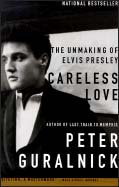 Careless
Love: The Unmaking of Elvis Presley
by Peter
Guralnick (1999) Careless
Love: The Unmaking of Elvis Presley
by Peter
Guralnick (1999)
If I had to pick one of Guralnick's pair of Elvis
biographies, I'd have to choose
the
first
one:
the making of a legend is more important than his unmaking, or at least I'd like to think so. But this
book,
the
conclusion of Guralnick's monumental series, is often the more fascinating of the two volumes. We cannot
avert our eyes as Elvis careers frightfully and repeatedly from peak to valley and, finally, ignominious
death. It's a tale as much about America and the nature of stardom as it is about a confused country
boy, and Guralnick's keen eye and painstaking research takes us to places never before seen. Like Last
Train To Memphis, Careless
Love is an unspeakably important book - this time, though, for much sadder reasons. [ top of page]
 Elvis
Day By Day: The Definitive Record Of His Life and Music
by Peter
Guralnick and Ernst
Jorgensen (1999) Elvis
Day By Day: The Definitive Record Of His Life and Music
by Peter
Guralnick and Ernst
Jorgensen (1999)
On the one hand, this book should have been subtitled "Elvis For Anal Retentives." On the other
hand, God (and the King) is in the details, and this book was compiled by two perfectly matched researchers
(and anal retentives). Peter Guralnick wrote the definitive biography of Elvis Presley ( see
above), and Ernst Jorgensen compiled RCA's definitive boxed set retrospectives of his music. Already
ahead of the curve, Guralnick and Jorgensen were given new and unprecedented access to the Graceland
archives, and the result is the most complete record of Presley's life ever written. Certainly, listen
to the music first, then read the story - but pick up this book to fill in the blanks. (Ernst Jorgensen
has also written a book chronicling Elvis' complete recording sessions, Elvis
Presley: A Life In Music.) [ top of page]
|
|